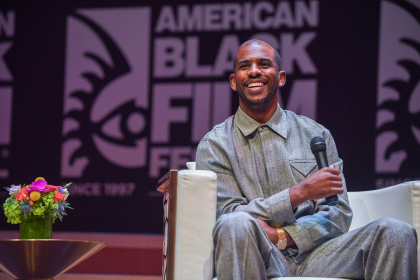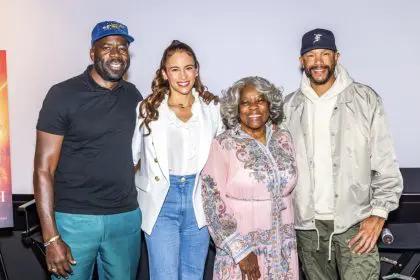photo credit: shutterstock.com
A year of excellence
The 2024 cinematic landscape has witnessed an extraordinary collection of Black films that transcend traditional storytelling boundaries. These works showcase diverse perspectives while tackling complex themes of identity, history, and resilience, positioning Black cinema as a significant force in the industry. From deeply emotional historical dramas to groundbreaking visual narratives, this year has seen Black artists redefine what it means to tell a story on the silver screen.
Historical power players
Several standout films bring crucial historical narratives to life, emphasizing the strength, bravery, and contributions of Black figures who have often been overlooked in mainstream media. This year, these films have reminded audiences of the importance of representation and the power of retelling untold stories.
Shirley: Regina King’s portrayal of Shirley Chisholm, the first Black woman elected to the U.S. Congress, brings to light the unyielding determination and pioneering spirit of a political icon. The film dives into Chisholm’s fight for equality and her groundbreaking 1972 presidential campaign, where she broke barriers and challenged the political establishment. King’s nuanced performance embodies Chisholm’s resilience, sparking conversations about the present-day implications of her trailblazing path.
The Six Triple Eight: Directed by Tyler Perry, this historical drama sheds light on the 6888th Central Postal Directory Battalion, the only all-Black female battalion to serve in World War II. Perry’s film celebrates their immense contributions, confronting the dual struggles of fighting for their country while challenging the pervasive racial and gender biases of their time. The project has been lauded for its respectful storytelling and impactful performances, showcasing the strength of women who served with distinction and often went unrecognized.
The Piano Lesson: August Wilson’s Pulitzer Prize-winning play finds new life on film, directed by Malcolm D. Lee. The story follows a family divided by history and inheritance, centered around a priceless piano that symbolizes their complex past. The film intertwines personal and historical narratives, exploring themes of legacy, sacrifice, and the haunting impact of history on present-day lives. The adaptation preserves Wilson’s profound dialogue and themes, proving that the playwright’s vision continues to resonate with contemporary audiences.
Innovation in storytelling
2024 has also been notable for pushing creative boundaries, with filmmakers experimenting with genre, narrative techniques, and visual styles to captivate audiences.
The Book of Clarence: Jeymes Samuel, known for his bold, unorthodox approach, offers a reimagined biblical narrative that breathes life into the story of a man searching for purpose in a world filled with divine intrigue. Samuel blends gospel influences with powerful visual storytelling, crafting a tale that’s both timeless and fresh. The film’s use of non-linear storytelling and vivid cinematography has been hailed as a bold departure from conventional religious dramas.
Exhibiting forgiveness: Visual artist Titus Kaphar extends his artistic vision to the realm of cinema, crafting a narrative that examines themes of redemption and historical erasure. Kaphar’s seamless integration of visual art and film underscores his distinct style, resulting in a work that challenges audiences to see beyond the surface and question the notion of historical accuracy and artistic interpretation.
Nickel Boys: Based on Colson Whitehead’s Pulitzer Prize-winning novel, RaMell Ross’s adaptation explores systemic injustice through an innovative narrative approach. The film combines powerful performances with a unique blend of visual motifs and documentary-style footage to immerse viewers in the harrowing experiences of two boys trapped in a reform school in Florida. Ross’s poignant storytelling has received acclaim for presenting the past in a way that resonates with modern audiences, inviting critical reflection on ongoing issues of racial inequality.
Contemporary perspectives
The power of Black cinema extends beyond historical and dramatic narratives, reaching into contemporary themes that resonate with today’s audiences. Modern stories offer a refreshing take on universal experiences, tackling themes of friendship, community, and personal growth.
Bad Boys: Ride or Die: The beloved action-comedy franchise returns, exploring themes of brotherhood and loyalty in a new light. The film not only provides explosive action and laughs but also deepens the emotional stakes between the lead characters, played by Will Smith and Martin Lawrence, as they face personal challenges while navigating their roles as partners and friends.
The Supremes at Earl’s All-You-Can-Eat: Based on the novel by Edward Kelsey Moore, this film captures the enduring bonds of three friends whose weekly meetings at a Detroit soul food restaurant serve as both a sanctuary and a stage for personal revelations. The movie’s warm, relatable approach to friendship and resilience has captivated audiences, showcasing the beauty of human connection.
Breaking new ground
These films represent more than entertainment — they mark significant progress in representation and narrative control within the industry, opening doors for future generations of Black filmmakers and actors. By showcasing a range of genres, from action and drama to experimental and narrative-driven stories, Black cinema in 2024 has set a new standard, proving that diverse voices can shape the direction of the film industry.
The growing visibility of these projects reflects the collective efforts of artists and activists who have long advocated for inclusion and recognition. With more stories reaching wider audiences, the influence of Black cinema continues to expand, creating opportunities for stories that celebrate resilience, highlight social justice, and explore the multifaceted nature of the human experience.
















